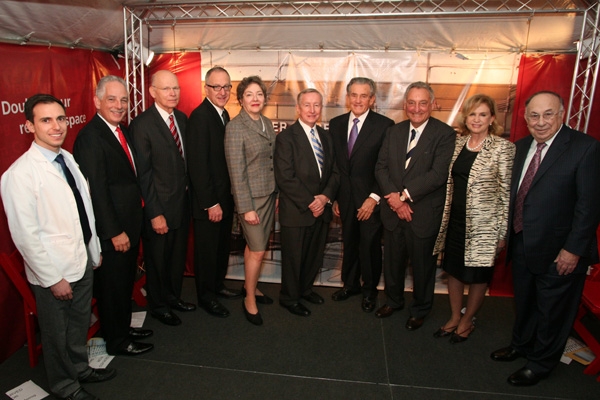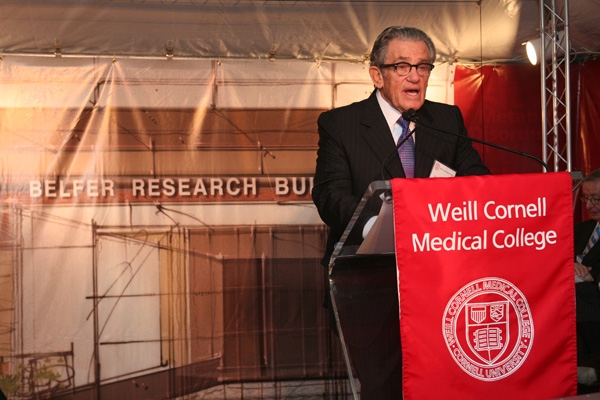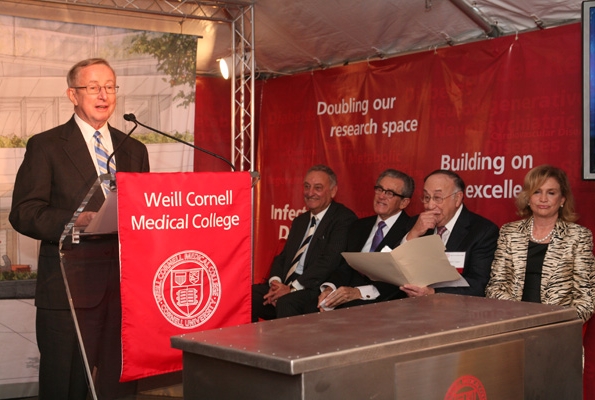Weill Cornell Medical College's new state-of-the-art medical research building, now rising on East 69th Street, will be known as the Belfer Research Building in honor of benefactors Renée and Robert Belfer, it was announced in a ceremony Nov. 9.
The Belfer Research Building will support the College's commitment to scientific exploration that may lead to pioneering new treatments and cures for some of the world's most daunting health challenges, cancer and infectious and neurodegenerative diseases among them.
Nearly 300 people, including donors and Weill Cornell and NewYork-Presbyterian officials, assembled next to the construction site for a ceremony to honor the Belfers, who donated $100 million toward the construction of the building, and the College's numerous benefactors.
"Coupled with the brilliant scientists already on staff and with additional ones being recruited, this building is certain to house discoveries that will benefit all mankind," Robert Belfer said. "To be able to have my name and the name of my darling wife, Renée, associated with this building is truly humbling."

Speakers at the event included (from left) Jeffrey Russ, student overseer; Dr. Steven J. Corwin, CEO, NewYork-Presbyterian Hospital; Peter Meinig, chairman, Board of Trustees, Cornell University; Dr. David Skorton, president, Cornell University; Florence A. Davis, president, The Starr Foundation; Dr. Gotto; Robert Belfer; Sanford Weill; Rep. Carolyn Maloney; and Robert Appel.
Scheduled to open in 2014, the building will double Weill Cornell's research space and enable the College to attract top-tier medical researchers.
Construction of a medical research building has been the long-held dream of Dr. Antonio M. Gotto Jr., the Stephen and Suzanne Weiss Dean of Weill Cornell Medical College, who is stepping down from his post at the end of the year. He will continue his administrative work with Cornell as a vice president for the university and as co-chairman of the Weill Cornell Board of Overseers while continuing scientific research.
"Today is a culmination of 15 years of visionary thinking and very hard work," said Sanford Weill, chairman of the Board of Overseers. "Today we see the tangible results of a comprehensive strategic plan that intended to do nothing less than completely transform an institution."
The $650 million building is the hallmark of Weill Cornell's $1.3 billion "Discoveries that Make a Difference" campaign, the country's largest for a medical college. Since the launch of the campaign in 2006, Weill Cornell has raised more than $1.1 billion, including 116 gifts of $1 million or greater. Of those gifts, 37 specifically support the new Belfer Research Building.
As construction proceeded nearby, leaders from Weill Cornell Medical College, Cornell University and NewYork-Presbyterian Hospital lauded the building and its promise to enable cutting-edge innovation in science and medicine.

Robert Belfer
"This is a once-in-a-century event," said Florence Davis, president of the Starr Foundation, speaking on behalf of Maurice Greenberg. "It's not about a building. It's about the people in the building." Corinne and Maurice Greenberg, chairman of the Starr Foundation and member of the College's Board, donated $25 million toward the Medical Research Building; the foundation gave an additional $75 million.
"What this is really about today is the American Dream, and I thank the Belfer family for their generous contribution for moving this project forward," said Rep. Carolyn Maloney, congresswoman for District 14, which encompasses Manhattan's Upper East Side, who spoke at the ceremony.
Just 18 months ago, the building site, 413 E. 69th St., was an empty crater that formerly housed various College departments and the city Department of Public Health. The finished building will be 18 stories, 480,000 square feet and built to be eco-friendly and sustainable.
Mr. Weill extolled Dr. Gotto's decade-and-a-half tenure at the College as the "golden age," as he spearheaded numerous projects, of which the Belfer Research Building is one, that transformed Weill Cornell from an institution with a mostly local reach to one whose influence has expanded both regionally and to the Middle East and Africa.
"The only way we can make serious strides in treatment and eventual cures for serious diseases will be through an intensive collaborative research effort, and nothing exemplifies this like the building that stands before us," Dr. Gotto said.

